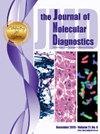PurIST 胰腺癌分类器:区分基础亚型和典型亚型的 16 种 RNA 表达特征的分析验证。
IF 3.4
3区 医学
Q1 PATHOLOGY
引用次数: 0
摘要
据报道,胰腺腺癌的两大分子亚型对基于FOLFIRINOX疗法的反应不同。为了促进基础亚型与经典亚型的快速分型,我们开发了一种基于阵列的单样本分类测定法,并将其应用于 74 份基于转录组学的已知亚型的 FFPE 活检或切除标本。肿瘤纯度独立亚型(PurIST)算法根据 RNAseq 计算的 16 种 RNA 的相对表达量与更实用的基于阵列的 NanoString nCounter Elements XT 技术进行亚型分配。RNAseq 和阵列方法对亚型的判定基本一致(72/74,一致率 97%)。与冗长的 RNAseq 程序相比,基于阵列的检测只需 3 个工作日即可完成分析,从而可以快速报告肿瘤亚型。总之,PurIST 胰腺癌分类器在将胰腺腺癌分为基底亚型和经典亚型方面表现出色。目前正在进行临床验证研究,以评估根据快速亚型分型选择标准化疗方案的患者的疗效(NCT04683315)。本文章由计算机程序翻译,如有差异,请以英文原文为准。
Purity Independent Subtyping of Tumors (PurIST) Pancreatic Cancer Classifier
The two major molecular subtypes of pancreatic adenocarcinoma reportedly have differential response to FOLFIRINOX-based therapy. To promote rapid assignment of basal versus classical subtypes, an array-based single-sample classifier assay was developed and applied to 74 formalin-fixed, paraffin-embedded biopsy or resection specimens of known subtype based on transcriptomics. The Purity Independent Subtyping of Tumors (PurIST) algorithm assigns subtype based on relative expression of 16 RNAs counted by RNA sequencing (RNAseq) versus more practical array-based NanoString nCounter Elements XT technology. Subtype calls were largely concordant between RNAseq and array methods (72/74, 97% agreement). Compared with the lengthy RNAseq protocol, the array-based assay takes just 3 working days to analyze, permitting rapid reporting of tumor subtype. In conclusion, the PurIST pancreatic cancer classifier has robust performance to classify pancreatic adenocarcinoma into basal versus classical subtypes. Clinical validation studies are underway to evaluate outcome in patients whose standard-of-care chemotherapy regimen is selected on the basis of rapid subtype assignment (NCT04683315).
求助全文
通过发布文献求助,成功后即可免费获取论文全文。
去求助
来源期刊
CiteScore
8.10
自引率
2.40%
发文量
143
审稿时长
43 days
期刊介绍:
The Journal of Molecular Diagnostics, the official publication of the Association for Molecular Pathology (AMP), co-owned by the American Society for Investigative Pathology (ASIP), seeks to publish high quality original papers on scientific advances in the translation and validation of molecular discoveries in medicine into the clinical diagnostic setting, and the description and application of technological advances in the field of molecular diagnostic medicine. The editors welcome for review articles that contain: novel discoveries or clinicopathologic correlations including studies in oncology, infectious diseases, inherited diseases, predisposition to disease, clinical informatics, or the description of polymorphisms linked to disease states or normal variations; the application of diagnostic methodologies in clinical trials; or the development of new or improved molecular methods which may be applied to diagnosis or monitoring of disease or disease predisposition.

 求助内容:
求助内容: 应助结果提醒方式:
应助结果提醒方式:


